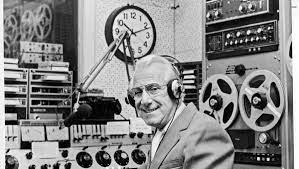In 1956 Americans were glued to their TV sets watching the new game show Twenty-One, hosted by Jack Barry and produced by Dan Enright. Charismatic brainiac Charles Van Doren ultimately “earned” $129,000 (the equivalent of $1,188,665 today) and became so famous he appeared on the cover of Time magazine. Twenty-One’s popularity had networks scrambling to create even more quiz shows like Dotto, The $64,000 Challenge, and Tic-Tac-Dough. But things changed fast after Twenty-One contestant Herb Stempel went public with the scandalous news that producer Enright choreographed the s how, and he’d purposely allowed Van Doren to win.
how, and he’d purposely allowed Van Doren to win.
Stempel’s admission marked the beginning of the end for the TV quiz shows of that era, and three years later, my less than successful radio career would briefly intersect with one of the key protagonists in this drama. Like dominos falling, contestants from other game shows claimed their contests had been rigged, and in late August 1958, a New York grand jury investigated the quiz fixing allegations. At the time, there were no regulations or specific laws barring game show fraud, and the grand jury handed down no indictments. But Congress took up the investigation resulting in an amendment to the Communications Act prohibiting such actions. The notoriety caused by the inquiry caused CBS to cancel three more large-prize quiz shows in October 1959: The Big Payoff, Top Dollar, and Name That Tune.
Enright took most of the heat for the scandal, but the two men had worked closely together as part of Barry & Enright Productions. The scandals tarnished their reputations, and both men were effectively banned from television. Enright found work in Canada while Barry remained in New York but could not find any TV work for several years. In the fall of 1961, Barry moved to Hollywood, Florida, where he and Enright owned a small AM radio station, WGMA, which they had purchased in 1957. And this is where the coincidental intersection of Barry and DiGenti took place.
Like most Americans, I had followed the scandal in the news, but in 1959 I was in my first year at the University of Florida, worried more about passing my courses than what was happening on the nation’s airwaves. Ironically, I would switch majors the following year from English to Broadcasting (later changed to Telecommunications). As part of my interest in my new major, I took a part-time job at the college’s radio station, WUFT-FM, which was a classical music station at the time. Later, I would operate a studio camera for WUFT-TV when the station’s studio was located beneath the athletic department’s offices.
In the summer of 1962, I found work with WGMA, Barry and Enright’s Hollywood station as a part-time DJ and gofer, working whatever low-rated shift no one else wanted to work. I assume my WUFT-FM experience, paltry though it was, helped me land the job, or the program manager was either inordinately kind or quite desperate. I took that gig at WGMA (now WLQY), unaware that Barry and Enright owned it. I’m not sure how I eventually learned of the connection, but I only had one glimpse of Barry during my two months on the job. He came to the station with two other men—one of them might have been Enright—and I instantly recognized the man who had been a staple on CBS for so long. That was it. We never spoke, and he didn’t acknowledge me as they passed. Barry’s career, by the way, rebounded, and he went on to host The Joker’s Wild, but that wasn’t the end of my mediocre radio career.
I returned to Gainesville after that summer job to earn my degree and landed a job with WJXT-TV, then Jacksonville’s CBS affiliate. After two years on the production crew with some assistant directing experience thrown in, I departed and found work with WIVY-AM, Jacksonville’s first non-network independent radio station. Jacksonville radio pioneer Ed “Bell” Oberle owned WIVY. Ed Bell, his on-air name, taught radio communications at Rutgers before moving to Jacksonville in 1946, where he opened the Institute of Radio and Television to teach veterans about radio engineering. He started WIVY in 1950, and it became the number one station within a year, playing the more gentile popular music of the day.
 I was hired in what must have been another act of desperation for the early-morning shift, signing on each morning at 6:30 a.m. My job wasn’t that difficult. I’d read the headlines, and spin a few of the pop hits of the day from the station’s playlist, including Dionne Warwick’s Walk On By, Everybody Loves Somebody by Dean Martin, and Where Did Our Love Go by the Supremes. At 7:00 a.m. (I think), I threw it to Ed Bell, who broadcast The Ed Bell Show from his home “on the beautiful St. Johns River,” playing the theme, The Sunny Side of the Street. After Ed’s two-hour program of easy listening music and commentary by the mellow-voiced station owner, I would pick it up again and play the pop hits of the days, read some commercial copy along with news at the top of the hour. I used the on-air persona of “Bashful Vic,” which many people said suited me well.
I was hired in what must have been another act of desperation for the early-morning shift, signing on each morning at 6:30 a.m. My job wasn’t that difficult. I’d read the headlines, and spin a few of the pop hits of the day from the station’s playlist, including Dionne Warwick’s Walk On By, Everybody Loves Somebody by Dean Martin, and Where Did Our Love Go by the Supremes. At 7:00 a.m. (I think), I threw it to Ed Bell, who broadcast The Ed Bell Show from his home “on the beautiful St. Johns River,” playing the theme, The Sunny Side of the Street. After Ed’s two-hour program of easy listening music and commentary by the mellow-voiced station owner, I would pick it up again and play the pop hits of the days, read some commercial copy along with news at the top of the hour. I used the on-air persona of “Bashful Vic,” which many people said suited me well.
My radio gig started at about 5:45 a.m. when I’d stumble into the station, located, as I recall, in a small office building on San Marco Boulevard. I’d unlock the studio door with a key entrusted to me by the station program manager, assemble the records for that morning, and pull the wire copy from the teletype machines.
The Associated Press and United Press teletype machines were outside the studio in the hallway, noisily cranking out the latest news from around the globe. My job was to clear the wire each morning and select the most timely headlines to read. I loved these old machines with their clattering keys, ringing bells, and scrolling yellow paper. On rare occasions, a news flash rang a series of bells sending news editors all over the country running to discover the “transcendent important” event since the flash signaled only events of the highest priority.
headlines to read. I loved these old machines with their clattering keys, ringing bells, and scrolling yellow paper. On rare occasions, a news flash rang a series of bells sending news editors all over the country running to discover the “transcendent important” event since the flash signaled only events of the highest priority.
On this particular morning, there must have been too few neurons flashing in my brain. When I stepped into the hallway to clear the wire for that morning’s news, I neglected to turn the lock on the studio door, which I quickly discovered when I attempted to reenter the studio. My keys, of course, were in my jacket draped across my chair inside the locked studio.
Can you say “Panic,” boys and girls? That early in the morning, there was seldom anyone else in the building, but I ran from door to door, floor to floor, searching for someone, anyone, to help me reenter the studio before the 6:30 sign on time. Alas, I was alone, and 6:30 came and went while I scrambled outside hunting for a telephone booth (remember them?) When I found one, I called the program manager, who I learned had been calling the studio when we hadn’t signed on—I’d been taught that the only acceptable reason for dead air involved cardiac arrest. Speaking with the harried PD, I told him of my plight, and he hastened to the studio to unlock the door. Unfortunately, by this time it was well past the 7:00 a.m. start time for The Ed Bell Show. After signing on, I made a few brief remarks, apologizing for the delay and joking about my problem with door locks before throwing it to the man broadcasting from his home on the beautiful St. Johns River.
Mr. Bell, sounding as cool and mellow as ever, covered beautifully for my error and introduced the first song. I don’t recall what he played, though I like to think it was either Don’t Let the Sun Catch You Crying or Under the Boardwalk, where I wanted to hide. Moments after the opening beats of that record, the phone in the studio lit up. I watched the blinking light with a sense of mounting dread before answering. Of course, it was the man himself, not so cool now, but still mellow of voice, informing me sternly that I was to never, ever again speak during his airtime and taking me to task for what had happened that morning. All I could do was gulp and issue a few contrite “Yes sirs.”
The following week I was asked to return the studio key and summarily fired.
After selling WIVY-AM and FM in 1971, Bell became station manager of WKTZ-FM/Jones College Radio. He had a storied career in Jacksonville radio and wrote and self-published his biography in 2006, Against All Odds: The True Life Saga of a Broadcast Legend. In the spiral-bound memoir, he revealed he had been kidnapped by his father at the age of five and never saw his mother again. Bell died in 2013 at the age of 100, but what happened to the recently engaged young man he fired in 1964? From failed radio announcer, I worked briefly as a less than successful Kirby Vacuum Cleaner salesman before landing a position as a director with WJCT-TV in 1965. But that’s another story.
 To celebrate the 20th anniversary of the first WINDRUSHER, I updated all three novels with minor revisions and combined them into a “boxed set” collectible Kindle edition. They’re now available on Amazon. You don’t have to be a cat lover to be moved by Windrusher’s adventures, but you’ll want to hang on tight and remember to breathe.
To celebrate the 20th anniversary of the first WINDRUSHER, I updated all three novels with minor revisions and combined them into a “boxed set” collectible Kindle edition. They’re now available on Amazon. You don’t have to be a cat lover to be moved by Windrusher’s adventures, but you’ll want to hang on tight and remember to breathe.








